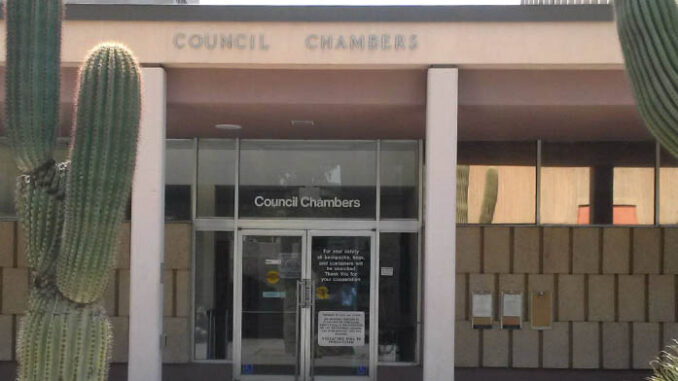
In a victory for the rights of Arizona’s charter cities, the Arizona Supreme Court ruled Wednesday that legislators strayed out of their lane in 2018 by requiring some cities to schedule local elections in concurrence with statewide elections.
“Whether to align municipal elections with state and national elections or hold them in different years is purely a matter of municipal interest and not a statewide concern,” Vice Chief Justice Ann Timmer wrote for the majority opinion. “Consequently, we hold that § 16-204.01 cannot apply to require a city to consolidate local elections with state and national elections if its charter provides otherwise.”
Starting in 2014, the Arizona legislature required most political subdivisions of the state to conduct candidate elections on dates set for state and national elections in even-numbered years, also referred to as on-cycle elections. Two charter cities -including Tucson- challenged that law and the Arizona Court of Appeals shot down the requirement.
But legislators who contended on-cycle elections was a matter of statewide concern, arguing that it would probably increase voter turnout. The result was a new law, ARS 16-204.01, passed in 2018 which forced political subdivisions to switch to on-cycle elections if voter turnout during an odd-numbered (or off-cycle) dropped by 25 percent or more from the turnout in the most recent election involving the governor’s office.
The City of Tucson pushed back again on the legislators’ interference with how local elections are held. City voters even rejected a ballot referendum in 2018 to change the city’s charter to allow for an on-cycle election schedule.
As a result, city officials refused to comply with the statute and announced election dates for 2019 and 2021. Arizona Attorney General Mark Brnovich took the position that Tucson’s actions might violate the 2018 law, so he sought review by the Arizona Supreme Court to resolve the question.
Justice Timmer’s opinion notes Arizona’s Constitution authorizes any home rule city with a population greater than 3500 people to frame a charter controlling its own government. She noted, however, that whatever powers a city exercises under its charter must be “consistent with, and subject to, the Constitution and laws of the state.”
In keeping with earlier court rulings, Timmer noted that any home rule city, like Tucson, which derives its powers from the Constitution “is independent of the state Legislature as to all subjects of strictly local municipal concern” and that the question is whether the scheduling of municipal elections is a matter “of purely municipal concern or is also one of statewide interest.”
In a five to one decision, the opinion notes the 2018 law requiring a change to even-numbered year elections when voter turnout drops is unconstitutional as applied to those cities whose charter mandates off-cycle elections. ARS 16-204.01, however, continues to apply to non-charter political subdivisions and to charter political subdivisions whose charters do not authorize off-cycle elections, Timmer wrote.
Tucson can thus move forward with its odd-numbered year elections, which city officials contend ensures more attention to local matters which might otherwise be overshadowed during statewide and federal elections.
Timmer also ordered that the city may apply to the court for an award of attorney fees as the prevailing party. Justice Clint Bolick dissented, arguing that when a city’s charter conflicts with state law the state law should prevail.
Among those who filed Amicus Curiae, or friend of the court, briefs on behalf of Tucson were the charter cities of Phoenix, Prescott, Scottsdale, and Tempe. The state’s other charter cities are Avondale, Bisbee, Casa Grande, Chandler, Douglas, Flagstaff, Glendale, Goodyear, Holbrook, Mesa, Nogales, Peoria, Winslow, and Yuma
